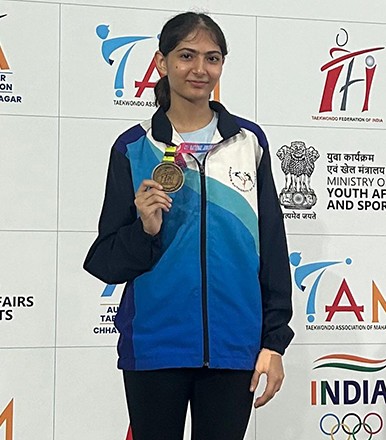“The path to a muscular physique starts with your plate,” many of us have heard or read this quote, but not many of us take this to heart. As a result, many men aspiring to build a bigger, stronger body assume that lifting weight is the only way to go. What they fail to realize is that true transformation lies in what you eat, how you eat, and when you eat. Without the right nutrition, even the most intense workouts won’t deliver the results you want.
Men spend countless hours in the gym every week, lifting weights and pushing their limits, yet see little to no progress. Why? Because they’re missing the key ingredient: a strategic, well-balanced diet that fuels muscle growth and supports overall health. It’s high time they realize that it’s not just about how much you lift – it’s equally important what you feed your body to repair and grow those hard-earned muscles.
Considering the importance of diet, we at HFM decided to converse with Neha Ranglani, a seasoned nutritionist and health coach. With over a decade of experience, Neha has helped countless individuals overcome barriers to muscle gain by integrating her knowledge of nutrition, digestion, and plant-based eating. Her holistic approach, which combines balanced meals, mindful eating habits, and proper nutrient absorption, can revolutionize the way you approach muscle building.
Key food for muscle growth
Without beating around the bush, let’s begin by understanding the right food for men looking to bulk up. According to Neha, for optimum muscle growth, “men should focus on consuming a balance of high-quality proteins, complex carbohydrates, and healthy fats that fuel muscle repair and growth.”
The keywords to take away from this are proteins, complex carbs, and healthy fats. Let’s break down why these macronutrients are essential and how the specific foods Neha mentions can serve as a foundation for muscle building:
Proteins are fundamental to muscle repair and growth. They provide the amino acids necessary to rebuild muscle tissues damaged during workouts. Hence, Neha recommends using plant-based protein sources such as tofu, tempeh, lentils, Quinoa, and hemp seeds. These options are not only rich in protein but also easier to digest compared to heavy animal proteins, reducing the likelihood of bloating and other digestive discomforts.
Carbohydrates are often considered enemies of fitness enthusiasts. However, that is not entirely true, as they are also essential for energy, especially after an intense workout. To fulfill this requirement, Neha emphasizes consuming complex carbs like sweet potatoes, oats, and brown rice. These carbs digest slowly, providing steady energy to fuel workouts and restore glycogen levels post-training.
Most fitness freaks would freak out reading the word "fats." But only a chosen few know that healthy fats exist. They play a vital role in muscle growth by supporting hormone production, particularly testosterone, which is essential for muscle-building in men. Neha advises incorporating fats from sources like avocados, nuts, flaxseeds, and omega-3-rich foods such as walnuts and chia seeds.
To make things easier for you, here’s where to begin with:
- Proteins: Tofu, tempeh, lentils, chickpeas, Quinoa, and hemp seeds offer complete, plant-based protein.
- Carbs: Sweet potatoes, oats, and brown rice provide long-lasting energy.
- Fats: Avocados, nuts, and flaxseeds support hormone health and reduce inflammation.
Importance of Portion and Metabolism
Eating the right food is essential, but consuming it in the correct proportion is just as important. You cannot go around piling on proteins, carbs, and fats without proper balance. If you choose to do so, before building muscle, you will certainly become host to digestive issues like bloating or fatigue, especially during intense training.
Before getting into the portion of your diet, you need to be wary that men have a faster metabolism, meaning they can burn calories quicker than women. This often leaves them with the requirement of consuming more calories, proteins, and carbs. But if you fail to keep your portion in check, the nutrients won’t be properly absorbed by your body and can eventually lead to poor digestion and gut health issues.
The simplest advice that Neha can give to her clients is, “Eat moderate portions. Smaller yet frequent meals every 3-4 hours will help you prevent overloading the digestive system.” Above all, drink plenty of water throughout the day to aid digestion and nutrient transport.
Eating habits are as important as the food itself. Chewing thoroughly is essential, as it aids in breaking down food and improves nutrient absorption. Additionally, mindful eating habits, like focusing on your meal rather than watching your phone or TV, can help enhance digestion and improve overall health.
Best protein source for vegetarians
India's cultural richness is often romanticized. However, it too comes with its stigmas. For example, not every Indian can eat the same meal to complete their protein intake. This creates a huge issue in our country. According to BBC reports and large-scale government surveys, 23%- 37% of Indians are estimated to be vegetarians. A bigger number abstains from consuming meat altogether.
This means that most Indians cannot consume dishes that are otherwise considered a good source of protein. Hence, finding, listing, and explaining the alternate source of protein for these people becomes important. We aim to do that through this segment, with Neha Ranglani on the tow.
Neha recommends various plant-based sources of proteins as an alternative to meat and beef that support muscle growth and overall health. She says, “Tofu and tempeh are excellent sources, providing complete proteins with all essential amino acids. Furthermore, lentils and chickpeas are high in both protein and fiber, promoting digestion while fueling muscle repair.”
According to her, quinoa is another important and unique source of protein. This grain is also easy to incorporate into meals. These sources should be ideal choices for anyone looking to move away from animal-based products.
The path to building muscle is paved by lifting weights and fueling your body with the right nutrition. Neha Ranglani’s expert guidance shows us that a well-balanced, plant-based diet can be just as effective for muscle growth as traditional approaches, with added benefits for digestion and overall health.
By focusing on quality proteins, complex carbs, and healthy fats, while embracing mindful eating habits and portion control, men can enhance their muscle-building journey significantly. As you incorporate these strategies, remember that your plate is as powerful as your workout. Let your nutrition be your strength.














